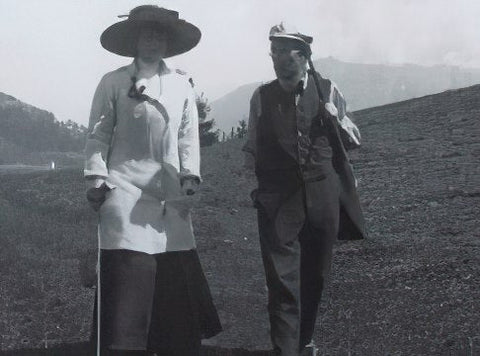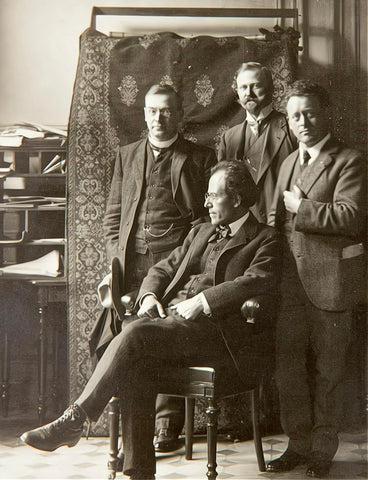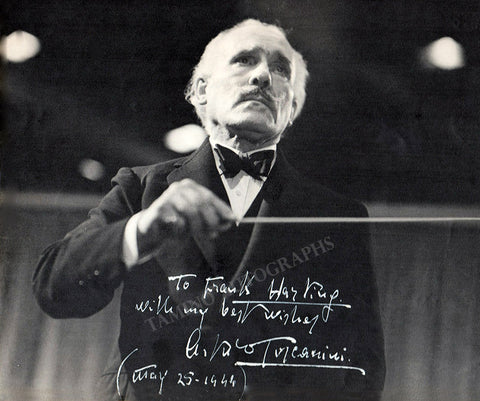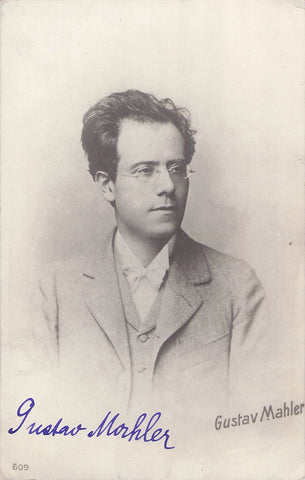Titans on the Met Podium, 1907-1909: Mahler and Toscanini March 24 2023
HEINRICH CONRIED FIRED BY MET BOARD
In June 1907, when Heinrich Conried announced “the engagement of the very best of all musical directors Gustav Mahler,” his own days as impresario of the Metropolitan Opera were numbered. The Board, deeply dissatisfied with his decisions about repertoire and casting, and his crass personality, decided the 1907-08 season would be his last.
GUSTAV MAHLER HIRED BY THE MET
He had, however, succeeded in bringing to contract Gustav Mahler who had wrought miracles at the Wiener Hofoper (now Wiener Staatsoper) for ten years. The Globe pronounced Mahler a factotum of genius: “He was orchestral conductor, singer, actor, stage manager, scene painter, costumer.”
[CLICKABLE IMAGE] A young Gustav Mahler
Mahler, who had made the Austrian capitol one of Europe’s great centers of opera, had tired of Viennese political infighting and persistent anti-Semitic barbs, despite his conversion to Catholicism. Conried’s contract offered three times the fee he was earning in Austria, plus paid travel and hotel expenses, stipulating a term of four seasons, with a commitment to three months each season.
MAHLER'S DEBUT SEASON
On New Year’s Day 1908, Gustav Mahler’s debut immediately proved the wisdom of Conried’s investment. The reviewers, many of whom had heard extraordinary interpreters of Richard Wagner in the pit since the Met’s second season, 1884-85, heaped their praise on the debutant. “The score was revealed in all its complex beauty, with its strands of interwoven melody always clearly disposed and united with an exquisite sense of proportion and an unerring sense of the larger values.” (Times)
MAHLER ON THE PODIUM
Mahler also impressed with his polite manner and his consideration of the artists. In contrast to the imperious baton of all too familiar abusive dictators, he “was as mild and gentle as the proverbial lamb.” (Globe) In addition, Mahler led Die Walküre, Siegfried, and new productions of Don Giovanni and Fidelio, restagings of two of his Vienna triumphs and for which New York loudly hailed him.

Gustav and Alma Mahler
GATTI AND TOSCANINI AT THE MET
The 1908-09 season marked a drastic change in Mahler’s New York fortune. Conried had been succeeded in the manager’s office by the remarkable director of Milan’s La Scala, Giulio Gatti-Casazza, who brought with him a conductor as prestigious and revolutionary as Mahler.
TOSCANINI'S MET DEBUT
The impact of the new regime was unmistakable on opening night 1908, with a spectacular new décor for Aïda and a spectacular cast headed by Enrico Caruso and a brilliant new soprano, Emmy Destinn. But it was the new conductor who made the most incisive impact on the reviewers, and certainly on the audience.
TOSCANINI AND THE NEW YORK PRESS
Arturo Toscanini, who had collaborated with Gatti-Casazza in the reform of opera in Milan, was deemed by Gotham’s newspapers “one of the most striking musical personalities New York has ever known.” (The Press) The critics were unanimous in their dithyrambic praise of the conductor who “was really the star last night.” (Evening Journal) And so he would prove to be for the remaining six seasons of his Met tenure.

Chotzinoff (Toscanini's biographer), Toscanini and his wife Carla
MAHLER VS. TOSCANINI
Although the Met was deemed fortunate “in possessing two conductors of the deservedly high rank of Mr. Toscanini and Mr. Mahler,” (Globe) the company’s annals make clear that Toscanini had immediately become the dominant figure.
MAHLER'S 1908-1909 MET SEASON
Mahler took part in twenty-five performances, some of which were only brief contributions to concerts and galas. He repeated Fidelio and Tristan und Isolde from the previous season and led a superlative new production of Mozart’s Le Nozze di Figaro and the Met premiere of Bedrich Smetana’s The Bartered Bride.
TOSCANINI'S 1908-09 MET SEASON
Toscanini took the podium seventy times, leading four works by Verdi, three by Puccini, Mascagni’s Cavalleria rusticana, Bizet’s Carmen, and two Met premieres, Catalani’s La Wally and Puccini’s Le Villi. Perhaps most newsworthy was Toscanini’s capture of Wagner’s Götterdämmerung, a title that logically ought to have fallen in Mahler’s domain. The Italian conductor, the Verdi-Puccini specialist, was also an inveterate Wagnerian.
MAHLER AND TOSCANINI, 1909-1910

The following season he even snatched Tristan und Isolde from Mahler who, in 1909-1910, on 39th Street, conducted on only four occasions, but memorably, the United States/Met premiere of P.I. Tchaikovsky’s The Queen of Spades, the first Russian opera (albeit sung in German) presented at the Met.
[IMAGE] Gustav Mahler, Willem Mengelberg (front), Cornelis Dopper, and Hendrik Freijer (back) at Concertgebouw 1909
MAHLER AT THE NEW YORK PHILHARMONIC
Mahler kept his place in the New York music scene through his seventy-five appearances with the New York Philharmonic, beginning as guest conductor in November 1908, then soon as music director. He professionalized the orchestra, increased the number of concerts, greatly enriched its repertoire, and toured extensively in New England and elsewhere.
MAHLER LEAVES NEW YORK
But frail and ailing, Mahler found himself in frequent conflict with the Philharmonic board. His final concert in New York, February 1911, featured two contemporary (now forgotten) Italian composers, Leone Sinigaglia and Giuseppe Martucci. He returned to Vienna where he died, two months later, only fifty years old.
The face-off between Mahler and Toscanini was regrettably brief, but while it lasted Met audiences feasted on an extraordinary diet of music-making. On February 20, 1909, for instance, imagine being witness to Mahler’s breathtaking Fidelio and on the next evening Toscanini’s shattering interpretation of Verdi’s Manzoni Requiem.

A gorgeous photograph of the Italian conductor conducting signed and inscribed by him in 1944
Charles Affron, co-author (with Mirella Jona Affron) of Grand Opera: The Story of the Met, and the blog OperaPost; author of the recently published opera-themed novel Just Off Grand.
SEE ALSO:
- Arturo Toscanini Genuine Baton
- Gustav Mahler Autograph Note & Photo
- Gustav Mahler Signed Contract 1898
- Conductors Autographs & Memorabilia at Tamino Autographs
- Concert Programs Signed by Conductors at Tamino Autographs
RELATED BLOGS:
- Hermann Levi: A Champion of Progress and Tradition
- Top 10 Famous Conductors in Classical Music and Opera
- James Levine: Conductor and Scandal
- The Arturo Toscanini Tours and His Wider Repertoire
- Italian Conductor Guido Cantelli: His Life and Times
- Leonard Bernstein Conducting the New York Philharmonic
- Gustavo Dudamel Next Music Director New York Philharmonic
OTHER METROPOLITAN OPERA RELATED BLOGS:
Interested in authentic autographs?



